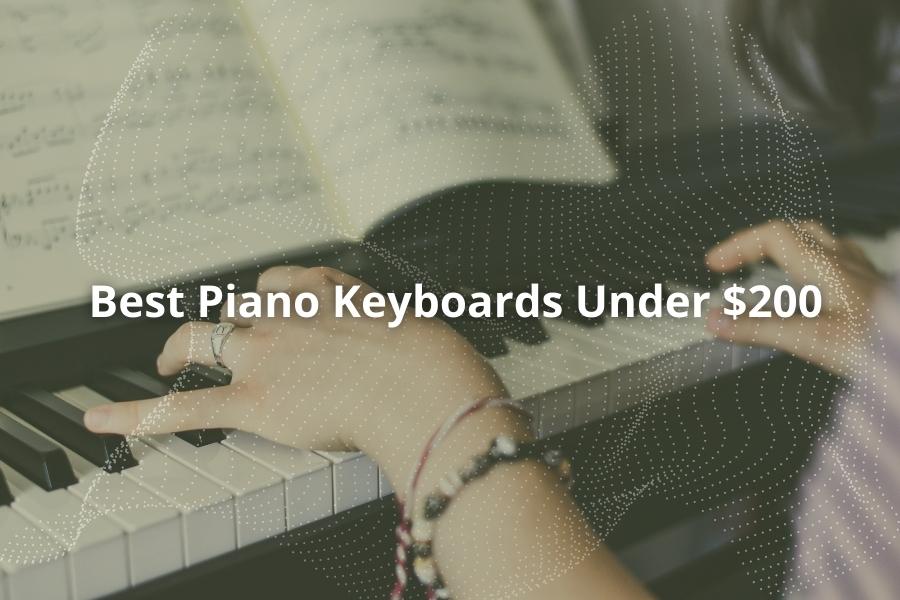A good affordable piano needs different features depending on the user (and so do other instruments).
Weight of the Keys: The feel of pressing a key on a keyboard and the sensation of playing an actual piano is different. Many keyboards are weighted to approximate the pressure needed to play a real piano and the feeling of pressing the keys.
MIDI: Musical Instrument Digital Interface (MIDI) Compatibility means other tools, such as a synthesizer or computer, that can interface with your keyboard when composing.
Portability and Easy Assembly: Keyboards are a lightweight alternative to a large piano. Quickly assembling and storing a keyboard in small spaces is an essential feature for many.
Headphones and Speakers: Your keyboard should allow you to plug in headphones for private practice and hit a relatively high volume if you expect to use it for small recitals.
54 keys vs. 61 or 72 Keys on a Digital Piano?
It’s all about size with a digital piano. A 54-key digital piano, a piano keyboard with 61 keys, and a 72-key instrument are all reduced versions of a standard 88-key piano. Shrinking your keyboard reduces your range but makes it much easier to fit and move. Smaller spaces need a 54-key instrument, whereas bigger areas can tolerate a 61 or 72-key digital piano. Few beginner pieces span the entire keyboard, so the reduction in keys is not a huge compromise for most people in the market for an affordable piano keyboard. A full 88 keys are recommended if you are interested in developing classical piano skills.
Best Keyboards Under $200
Budget piano keyboards don’t have to be ready for a big show. They’re built for beginners, practice, and perhaps a small recital. That said, technology packs a great deal of utility into our favorite digital pianos for under $200.
Best Complete Setup for a Beginner: Alesis Melody 61
Pros: The Alesis Melody 61 can be purchased solo or with a bench, headphones, and microphone. The complete kit will still keep you well below our $200 keyboard budget. Ensure everything fits and works together by purchasing it all in one go. It allows you to record, add sounds and percussion to richen your compositions,
Cons: As with any complete set, you compromise the quality of the primary instrument to get a full kit. Reviewers note that this set needs wired headphones and is not Bluetooth-compatible. Seasoned musicians note the “light” sound, but this is typical of almost every keyboard on our list.
Best Keyboard with Lighted Keys: Best Choice Products Beginner Keyboard
Pros: This techy keyboard with lighted keys allows you to play along with beginner songs while the notes appear on the LCD screen with customizable complexity. Best Choice Beginner is excellent for real-time feedback when attempting to learn to play piano without lessons. Of course, it’s a fine keyboard if you don’t activate the bells and whistles, too.
Cons: Some musicians find lighted keys distracting and don’t require the LCD panel to play sheet music, so they find the primary selling point, the light-up keys, unnecessary. Their investment is better spent on other upgrades or features.
Best 88 Key Digital Piano: Kmise Digital Piano 88 Keys Full Size
Pros: The Kmise Digital Piano provides great haptic feedback with its weighted keys. It includes MIDI, sustain pedal, and Bluetooth compatibility. Reviewers note that customer service for repairs and other issues is excellent.
Cons: Though excellent customer service is noted, many reviews mention that their keyboard broke after extended use. Though it offers some impressive features for beginners and developing musicians, it’s not pro-quality.
Best Mini Keyboard: RockJam 49 Key Keyboard Piano
Pros: Take your sound anywhere with this 49-key offering from RockJam. Install keynote stickers while you’re learning, and easily take your digital piano along for the ride.
Cons: It’s tiny. That means the keys are smaller. Your muscle memory in playing it will be completely different. Small keyboards limit your range and options for songs but get the job done in tiny spaces or with tiny fingers.
Best Foldable Piano Keyboard: Eastar EP-10 Beginner Foldable Digital Piano
Pros: Few foldable keyboards include all 88 keys. If you’re going to save space by folding the instrument in half, why not include them all? Eastar EP-10 does the job well and folds up into an easy carrying case to make the trip to your next gig. It fits in your suitcase and comes with a battery, so your digital keyboard performance is uncompromised by your remote location.
Cons: Because it is made to be extremely lightweight, some people find the Eastar EP-10 flimsy. It is not your primary instrument for performing or practicing, but it is an excellent tool in your arsenal for playing piano while traveling.
Best Roll-Up Keyboard: Lujex Keyboard Piano 61 Keys Roll-Up Piano
Pros: Purists, please hear us out! There is a place for a silicone keyboard on this list. You can’t play any other keyboard on our list in a swimming pool, after all. This water-resistant Lujex Keyboard fits in your beach bag like an extra towel.
Cons: Keys are closer together than on a regular keyboard, so the Lujex Keyboard roll-up feels different to play. Smaller musicians may struggle with the transition to this instrument. Some reviewers also note that the battery section can be difficult to disassemble and reassemble to charge or replace batteries.
Our Pick: Alesis Melody 61
Versatility and comprehensive features make The Alesis Melody 61 our pick for the best budget piano keyboard under $200. This kit has everything you need, from the bench seat to the headphones and microphone. Enticing features, settings, and recording options make this kit attractive to intermediate or more advanced musicians on a budget, as well.


